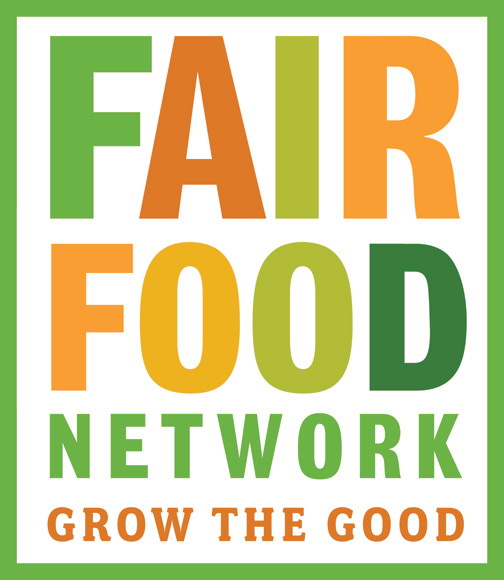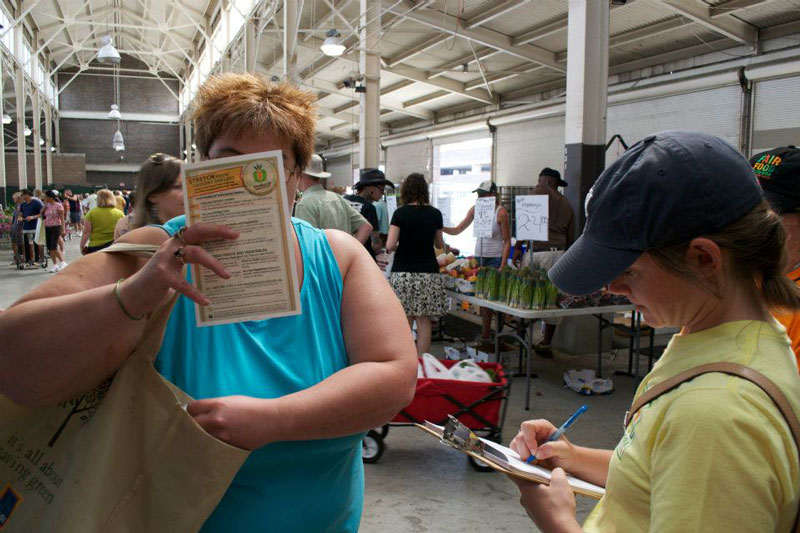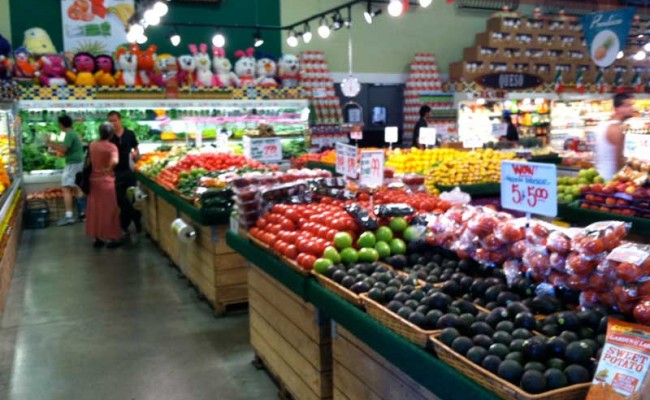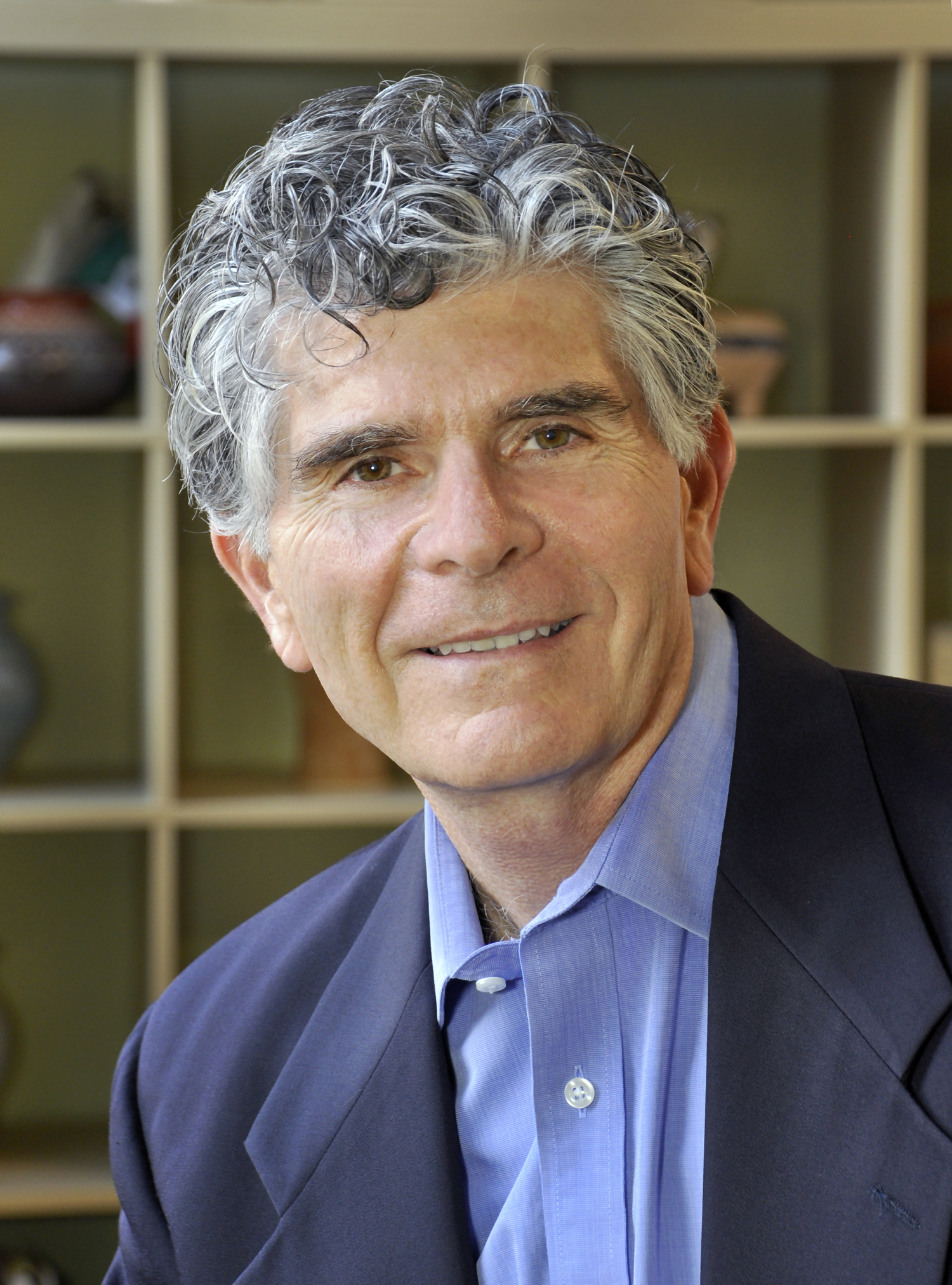MAKE TWICE THE IMPACT
Help us support healthier families, stronger local economies, and a more resilient food system for us all.
Your gift today will be matched thanks to the Hamp Family Fund.
June 25, 2013
Source: Detroit Regional News Hub
Author: Marge Sorge
Sitting in an office decorated with food-related art right above the Detroit Future City location in Eastern Market is the Fair Food Network. The location seems only right. Detroit Future City is a vision … a strategic framework … for the city. An essential part of that is ensuring vibrant neighborhoods. An essential part of vibrant neighborhoods is the neighborhood grocery store and access to fresh, healthy food. Enter the Fair Food Network and its President and CEO Oran Hesterman.
The Fair Food Network seeks to redesign the nation’s food system so it is based on equity, diversity, ecological integrity and economic viability. Hesterman says right now the food system in the US and Detroit is, well, just plain broken.
 “We need to fix the food system and have national and local conversations about the solutions,” he said “We have to shift the system to make it work and raise the issue of the food system to serious national conversations.
“We need to fix the food system and have national and local conversations about the solutions,” he said “We have to shift the system to make it work and raise the issue of the food system to serious national conversations.
“Food is the most basic system we have. We can’t take food for granted … 13% of the people in the US are food insecure. One in seven in the US is on food assistance. In Michigan it’s one in five,” he said.
According to the Fair food Network, the situation in Detroit is dire:
500,000+ residents live in areas with limited or no access to grocery stores.
In the city of Detroit, there are 10 grocery stores for every 100,000 people. As a comparison, for every 100,000 people in San Francisco, there are 40 grocery stores. In Chicago – 42. In Ann Arbor – 21. In Oakland County – 23. In Wayne County – 26.
The existing full-service grocery retailers in Detroit currently capture only 69% of Detroit households’ grocery expenditures. However, Detroit residents are spending close to $200 million outside of their neighborhoods.
Detroiters could potentially support an additional 583,000 square feet of additional grocery retail space. Depending on their size, that could mean anywhere from 8 to 20 additional stores.
Current food options do not support healthy diets in Detroit. More than 70% of adults and close to 40% of Detroit’s youth are overweight or obese. Close to 75% of adults and more than 80% of young people do not eat adequate quantities of fruits and vegetables, according to USDA dietary recommendations.

Double Up Food Bucks launch at Eastern Market
To find out how Detroiters deal with the food issue the Fair Food Network held a phone town hall last year called Strengthening Detroit’s Voices. They talked with nearly 7500 Detroiters to find out the biggest issue they face in feeding their families. 58% said the food was just too expensive. 22% said they have no transportation, 11% said they don’t know enough about health food and food preparation and only 9% said they had no time.
While part of the solution involves bringing more grocery stores into Detroit neighborhoods, there much more to it. Convenience stores need to carry fresh food and more farmers markets are needed in the inner city with extensions in the neighborhoods. And, high on the list is weaning children away from fast food with nutritious alternatives.
To help deal with these issues Fair Food is partnering with organizations such as Eastern Market, Forgotten Harvest, Gleaners and urban farms to bring fresh food to the tables of those who need it from farmers and other sources nearby.
“Ground zero is Eastern Market,” Hesterman said.
Fair Food Network launched the Double Up Food Bucks program. It piloted in Detroit and allows those on the federal Supplemental Nutrition Assistance Program (SNAP) to double the value of their aid at local farmers markets. At farmers’ markets, Double Up Food Bucks will match any SNAP purchases at the market up to $20 per market day, with the matching tokens only valid for Michigan grown fresh fruits and vegetables.
Three independent grocery stores—Honey Bee Market, Metro Foodland and Mike’s Fresh Market (Gratiot location) — are participating and the program runs from July 1 and Oct. 31, 2013. This pilot phase is expected to increase access to healthy food for 5,000 low-income Detroiters. It launched in Southeast Michigan in August 2010.

Produce at Honey Bee Market
Here’s how it works. In grocery stores, customers who spend at least $10 on fruits and vegetables using a SNAP (Supplemental Nutrition Assistance Program) EBT card will receive a Double Up Food Bucks card worth $10 toward their next purchase of Michigan-grown produce.
The Double Up Food Bucks program has been operating in Michigan since 2009. Since then more than $320,000 in Double Up Food Bucks have been distributed in participating markets in Michigan, totaling nearly $700,000 spent on fresh, local produce by Michigan growers and food businesses since the start of the program. That’s according to the W.K. Kellogg Foundation, which helped fund the program.
By 2012, with the support of nearly 40 foundations, it had expanded statewide to include 75 farmers’ markets. In 2012, SNAP recipients made 89,428 visits to 75 participating markets statewide – and 13,306 customers visited a farmers’ market.
In a 2012 Fair Food Network survey of the program, 83 percent of participating farmers said they made more money at farmers’ markets with Double Up Food Bucks. More than 75 percent of SNAP users said the program helped increase the amount of fruits and vegetables they consume.
Not only does the Double Up Food Bucks project help families buy more Michigan-grown fruits and vegetables, it also helps support local food growers and the local food economy. From 2009 – 2012, more than $3 million in healthy, fresh, locally-produced foods have been purchased by customers using SNAP benefits and DUFB at participating markets.
Just for the record there are 1.9 million SNAP recipients in Michigan — that’s 19% of our state’s population (the national average is 15.4%).
Hesterman hopes to find more philanthropic dollars for the Double Up Food Bucks program.
 The Fair Food Network has done some tremendous things but the road hasn’t been easy. Hesterman said Fair Food lost $20 million in annual funding because of the Madoff Ponzi scheme back in 2009. As a result, the Ann Arbor-based Fair Food Foundation (the precursor to the Fair Food Network) was forced to shut down. Its primary donors, local philanthropists Jeanne and Kenneth Levy-Church, lost a good deal of money when they invested with Bernard Madoff and could no longer donate to the cause. A never-say-die kinda guy, Hesterman kept pushing on.
The Fair Food Network has done some tremendous things but the road hasn’t been easy. Hesterman said Fair Food lost $20 million in annual funding because of the Madoff Ponzi scheme back in 2009. As a result, the Ann Arbor-based Fair Food Foundation (the precursor to the Fair Food Network) was forced to shut down. Its primary donors, local philanthropists Jeanne and Kenneth Levy-Church, lost a good deal of money when they invested with Bernard Madoff and could no longer donate to the cause. A never-say-die kinda guy, Hesterman kept pushing on.
“I love the work I was doing,” he said. So with grants from the Kresge Foundation, the Community Foundation of Southeast Michigan and the New York-based Woodcock Foundation reopened the program as the Fair Food Network, a non-profit with one goal … to get local fresh food on local tables from the nearest possible point. He points out that often food comes from 1,500 miles away … pretty dumb when we have it right in our backyards.
“Fair Food’s goal is to shine the light on new food systems,” Hesterman said. “It should be a national priority.”
Food for thought.
First posted on Detroit Regional News Hub on June 20, 2013.